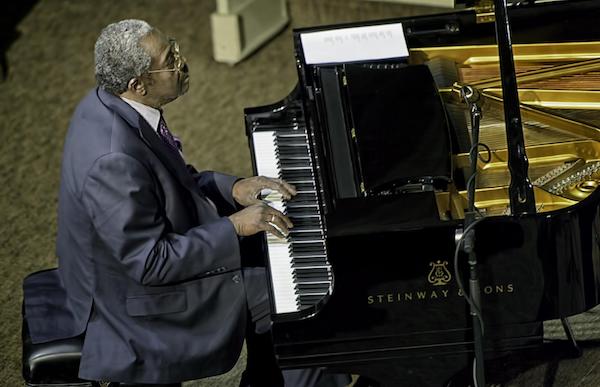Jan 13, 2026 2:09 PM
More Trump-Kennedy Center Cancellations
The fallout from the renaming of the John F. Kennedy Center for the Performing Arts to include President Donald…

Larry Willis (1942–2019)
(Photo: larrywillisjazz.com)Larry Willis, a consummate pianist, composer and producer, died of an aneurysm on Sept. 29 at Baltimore’s Mercy Medical Center. He was 76.
As a pianist, Willis harnessed a thick, orchestral touch. Still, he was a nimble and resourceful improviser who would draw from a deep well of influences. “The thing that really impressed me about Larry’s musicianship was that he could adapt to multiple styles of music—from hard-bop, bebop, ballad to rock. He was a master of them all,” said drummer and vibraphonist Warren Wolf, who as a Berklee College of Music student in the late-1990s first learned about Willis.
During a career that stretched across five decades, the keyboardist released more than 20 albums as a leader, including gems like 1973’s Inner Crisis (Groove Merchant), 1992’s Solo Spirit (MapleShade) and his final 2011 solo album, This Time The Dream’s On Me (HighNote). In 2015, Smoke Sessions Records released Search For Peace, a disc by the cooperative ensemble Heads Of State that featured Willis playing with bassist Buster Williams, drummer Al Foster and alto saxophonist Gary Bartz.
MapleShade Founder Pierre Sprey, who worked with Willis for more than a decade, praised him as a “born accompanist.”
“He was a very committed accompanist. He was one of those rare people who could sit in with a band that’s having a lame evening, and within the span of eight bars, Larry could generate this electricity that would just ripple across the bandstand. Then all of the sudden, the band would be cooking its ass off,” Sprey said. “That would happen without Larry doing anything showy. He just loved to make other people sound better.”
What’s interesting, though, is that jazz—and even piano—wasn’t what Willis first was smitten by.
Born Lawrence Elliott Willis in New York City on Dec. 20, 1942, he grew up in a household filled with European classical music. His older brother, Victor, was an accomplished classical pianist. Larry’s earliest music aspiration, however, was singing opera. But during his senior year at New York’s Music and Arts High School, he taught himself how to play the piano. Soon after, he played in a jazz trio with classmates—Foster and bassist Eddie Gomez.
During high school, Willis also aspired to become a professional basketball player; he even was offered a few athletic scholarships. But his passion for music triumphed, and he enrolled at the Manhattan School of Music, where he studied music theory and voice. Once there, he met South African trumpeter Hugh Masekela, whom he would perform and record with regularly. It was Masekela who encouraged Willis to take private piano lessons from John Mehegan to strengthen his jazz chops.
Willis progressed so quickly that before he turned 20, he was playing with pioneering alto saxophonist Jackie McLean. Several years later, the keyboardist not only performed on two of McLean’s mid-1960s Blue Note classics—Right Now! and Jacknife—he contributed a few compositions as well. Right Now! featured Willis’ stirring ballad “Poor Eric” (a tribute to Eric Dolphy) and the blistering “Christel’s Time,” while Jacknife contained his terse and episodic “High Frequency” and the snazzy soul-jazz ditty, “The Bullfrog.”
The following decade would prove to be a defining one for the keyboardist.
Willis issued his debut LP as leader, A New Kind Of Soul in 1970 on the Brunswick imprint. The album captured the avant-garde leaning soul-jazz zeitgeist of its day with a rollicking cover of James Brown’s “Lickin’ Stick” and the pensive original ballad “Someday Soon.” Although, it showcased Willis leading a small ensemble, the music sometimes exuded an orchestral sound thanks to the bandleader’s arrangements for three flugelhornists.
Willis’ continued exploring soul-jazz, funk and electric piano on his 1973 sophomore album, Inner Crisis, which today is considered a rare-groove classic among jazz fans and record collectors. In between those two dates, Willis also joined Blood, Sweat and Tears, taking over for Dick Halligan. Also during the early 1970s, Willis joined alto saxophonist Cannonball Adderley’s band. And coincidentally, he joined the saxophonist’s brother, trumpeter Nat Adderley, in a group after his five-year tenure with Blood, Sweat, and Tears.

Belá Fleck during an interview with Fredrika Whitfield on CNN.
Jan 13, 2026 2:09 PM
The fallout from the renaming of the John F. Kennedy Center for the Performing Arts to include President Donald…

Peplowski first came to prominence in legacy swing bands, including the final iteration of the Benny Goodman Orchestra, before beginning a solo career in the late 1980s.
Feb 3, 2026 12:10 AM
Ken Peplowski, a clarinetist and tenor saxophonist who straddled the worlds of traditional and modern jazz, died Feb. 2…

The success of Oregon’s first album, 1971’s Music Of Another Present Era, allowed Towner to establish a solo career.
Jan 19, 2026 5:02 PM
Ralph Towner, a guitarist and composer who blended multiple genres, including jazz — and throughout them all remained…

Rico’s Anti-Microbial Instrument Swab
Jan 19, 2026 2:48 PM
With this year’s NAMM Show right around the corner, we can look forward to plenty of new and innovative instruments…

Richie Beirach was particularly renowned for his approach to chromatic harmony, which he used to improvise reharmonizations of originals and standards.
Jan 27, 2026 11:19 AM
Richie Beirach, a pianist and composer who channeled a knowledge of modern classical music into his jazz practice,…